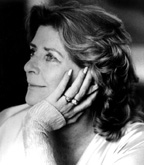One Art
BY PROF. VAROL AKMAN
Carolyn Kizer
“I guess the thing that really clinched it for me was the notion that I wanted to stay as far away from capitalism -- buying and selling, the material world -- as I possibly could, and poetry was clearly the solution to that!"
Carolyn Ashley Kizer was born December 10, 1925 in Spokane, Washington. (She shares her birth date with Emily Dickinson.) Encouraged by her mother she began writing poems when she was in elementary school. Her father read Keats to her while she rested on the couch suffering from asthma.  Kizer later idolized Whitman although she always paid attention to metrical verse more. This is her explanation: "Meter is as natural as breathing or the heartbeat. I think my childhood asthma had a lot to do with my consciousness of the breath unit - in a sense I've never really taken breathing for granted."
Kizer later idolized Whitman although she always paid attention to metrical verse more. This is her explanation: "Meter is as natural as breathing or the heartbeat. I think my childhood asthma had a lot to do with my consciousness of the breath unit - in a sense I've never really taken breathing for granted."
After attending Sarah Lawrence College (B.A., 1945), Kizer did graduate work at Columbia University (1945-1946) and at the University of Washington, Seattle (1946-1947). A seven-year marriage ended with divorce and three kids, and she began studying poetry with Theodore Roethke in 1954. "Most women poets of my generation didn't dare take themselves seriously, because the men didn't take us seriously. (…) But Ted took poetry seriously, and taught me to do so eventually." A couple of years later Stanley Kunitz took Roethke's place. "I went to pick him up at 10 a.m. (he was fifty then) and he greeted me at the door with a martini in his hand. I thought, He won't last long." Kunitz recently died aged 100.
In 1959 she cofounded Poetry Northwest with two colleagues, and edited it for six years. After serving in Pakistan as literary expert for the U.S. State Department, she became the first director of literary programs for the newly formed National Endowment for the Arts in 1966. During her five-year tenure at the NEA, she created programs to assist budding authors and poetry projects for inner city schools.
Kizer's first collection of verse, The Grateful Garden, appeared in 1961. Her other poetry books include Knock Upon Silence (1965), Midnight Was My Cry: New and Selected Poems (1971), Mermaids in the Basement: Poems for Women (1984), Yin: New Poems (1984), The Nearness of You: Poems for Men (1986), Harping On: Poems 1985-1995 (1996), and Cool, Calm & Collected: Poems 1960-2000 (2001). Kizer wrote with wittiness of her involvement in the feminist movement; “Pro Femina,” one of her notable poems, is a tongue in cheek piece in this regard.
Kizer has received an American Academy of Arts and Letters award, the Frost Medal, the John Masefield Memorial Award, and the Theodore Roethke Memorial Poetry Award. She is a past chancellor of The Academy of American Poets. She received the Pulitzer Prize in 1985 for Yin, a collection that was more than a decade in the making.
Meticulous and multitalented, Kizer is an accomplished translator of poetry. Accordingly, I selected a translation of hers from Nina Cassian whom Kizer portrayed as "that noble poet." Cassian (b. 1924) is a prominent Romanian literary figure who traveled to the United States as a visiting scholar in 1985. However, when the Securitate- the secret service of the despotic regime - tortured to death a comrade for keeping a journal that also included sardonic verse by Cassian, she realized she should not go back and was subsequently granted asylum in the U.S. (The Securitate was closed down in 1989, after President Ceauşescu was ousted and executed.)
Kizer calls the following a "straight" translation. However, she also penned what she calls a "hipster" version that is obligatory reading. In any case, both translations appear in Harping On, "a generous and magisterial new book from a major American poet," in Marilyn Hacker's words. For apparent reasons I like to think this poem as operating on two dissimilar planes: that of romantic relationships and that of national ties that bind. (Cassian once said: "A poet never leaves his country, his native soil, his language, of his own free will.")
Tirade for the Next-to-Last Act
I'm leaving you, I won't touch you anymore.
I've run out of things I have to prove to you,
so there's no reason to postpone the drowning
of molecules called hands or eyes or mouth
in the patient earth which waits - but not for me.
Earth knows it owns me, right to horizon-zero.
I've told you almost everything I know;
even the lie I told was a pious lie
because it leapt to life, came into being
embodied as a leaf, or as a rabbit,
and I cannot reject a living creature.
Also, I leave you because I am so weary
of the way the century melts in the one before
as if the milk the child sucks from its mother
went back into her breast - or worse than that,
as if the brow of a philosopher
kept sloping back till it rejoined a species
long extinct, and hirsute, and prehensile.
I've picked up information on my way
but none of it from scholarly pursuits
or from the established canon of great books;
mostly from heat and cold, from birth and death,
all that comes past us only once, alas,
so it's no guide for what will happen next.
…